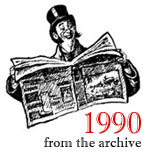
Nurturing Spirituality & Religion in an Age of Science & Technology
BEYOND THE AMORAL MARKETPLACE
Remarks to the American Academy of Religion, Anaheim, California, November 20, 1989.
There is a spectacular improbability — not to mention great chutzpah — in my appearance here today. I come before you as a writer/producer of primetime television entertainment — that’s the stuff between the ads for panty hose and Drano — and I come before you as a much-castigated secular humanist and fat cat businessman — to share my insights into spirituality and religious education. Ain’t that a riot? But before you laugh me off this podium, how about the idea of some obscure ministers from Lynchburg, Virginia Beach, and Baton Rouge becoming major television stars and political crusaders?
When my good friend Martin Marty first suggested that I might have something to say to this gathering, I became more than a little anxious. Clearly, I am not a student of church history, theology, comparative religion, and the many other subjects which engage your professional talents. I have, however, enjoyed a life-long love of America and the American people — and I believe I’ve developed a keen sense of the American culture. As a consequence, I’ve spent much of my career in television observing our national quirks and quiddities — and then amplifying them to TV shows.
So with all due respect for the vast storehouse of learning represented in this room, I want to talk today about our nation’s moral and spiritual life based on how I feel it — my intuitions, the vibrations that I feel in the air. All of these, I’d like to state up front, lead me to a deep concern about the unhealthy reticence that exists today to the general discussion of ultimate meanings and the spiritual life — in the media, in the social arena, and especially in our schools.
And yet, as we approach the millennium, I sense in most Americans a deepening thirst for spiritual authenticity, connection, and a sense of shared moral values. Most people are aware that society has lost its way and, whether or not they think of it in exactly these terms, there is a sense out there that, as a culture, it’s imperative we recover a sense of the sacred in our daily lives. By “sacred,” I am not talking about your sacred symbols or mine. If we can’t find what is sacred in that tree, in that butterfly, in each other, then the sacred symbols of our several religions will never satisfy that yearning for connection of which I speak.
You May Also Enjoy
Simony in the Church of England... A Bigger Sin Than Buggery?... The Face of "Gay" Clericalism
We need an overall increase in knowledge of the Catholic religion among all age groups in each diocese, in particular as concerns the sacraments.
The November 11, 1992, vote of the General Synod of the Church of England to…

